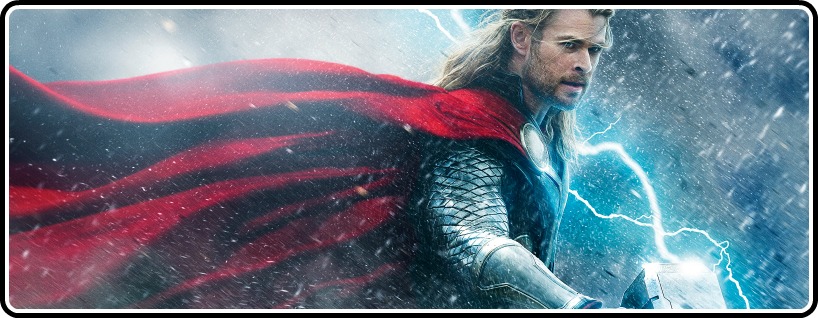While it may be November, right at the start of the 2013 “Awards Season,” the year’s best franchise picture, and easily its best comic book adaptation, may have just hit theaters.
Coming only a couple of years after the first film in Marvel’s Thor series, its sequel, Thor: The Dark World, has finally debuted, ostensibly capping off a season of monster budget blockbusters, and further expanding the seemingly never ending Marvel Cinematic Universe. In a year that saw middling-to-awful films in the Iron Man, Superman and Star Trek franchises, it has become this once thought unfilmable comic book character that stands as the year’s real comic book triumph, warts and all.
Picking up two years after the events of the first film, The Dark World finds Thor in his biggest and most difficult battle yet. With all of the nine realms back to peace after the destructive events of the first film, things appear to be lining up for Thor to take the throne of Asgard as its rightful new king. However, with the nine realms themselves alining for the once-in-five-thousand-years event known as The Convergence, and the discovery of an evil relic of a time of darkness, discovered by none other than Jane Foster, a new enemy has rises to turn this universe back to what it once was: pure darkness. With his brother in chains and his world crumbling around him, Thor must do everything in his power to save not only Asgard, but all of existence. All in a day’s work for a God, right?
Taking the reins from one Kenneth Brannagh, regular Game Of Thrones helmer Alan Taylor jumps behind the camera for this second film, and while it is a decided difference in aesthetics here, Taylor more than holds his own. A much more action-heavy feature than the first film, Taylor’s balance between the Earth hijinks and the fantasy-centric story unfurling throughout the remaining realms is deft and entrancing. The action here is not only utterly engaging but also breathlessly shot, never allowing the viewer to lose sight of what is occurring, who is involved, their motives, or its impact on the overall narrative. With a handful of action set pieces perfectly blending genuinely exciting action with some perfectly toned character moments, Taylor’s film (with a really good script from Christopher Yost, Christopher Markus and Stephen McFeely) never loses sight of what makes this part of the MCU its best.
And once again, the performances, are almost universally superb. Hemsworth is really proving himself to not only have the look of an A-list leading man, but also the charisma comparable to the best of them, and while some of the emotional sequences leave a bit to be desired, this type of role fits him like a glove. Opposite two monsters of acting, Tom HIddleston and Anthony Hopkins, he not only holds his own against both, but is able to add his own layer of depth to his relationship with their characters, to the point where it feels so full of life that it becomes a real testament to the actor Hemsworth is today, and has the potential to be down the line. Hiddleston and Hopkins are both absolutely fantastic here, particularly Hiddleston who really has lost himself in this role as the evil Loki. There are a couple of scenes, finding Loki within a cell, that are this film’s absolute best moments, particularly one that is so intriguing character-wise that I not even dare discuss it for fear of spoiling it.
However, the cast also brings with it the film’s two biggest flaws. First, the film’s villain, played by the ever entertaining Christopher Eccleston, feels barely there. Told to have enough power to bring all of existence to its knees, the stakes are admittedly high, but there is never a moment where you feel as though these characters are in any real danger. Maybe it’s an issue inherent in this type of serialized franchise picture (it still remains to be the biggest issue with all of Marvel’s stand alone films, save the first Thor film), but the performance is completely one note, never allowing Eccleston to mine the depths of his character’s need for revenge, nor becoming anything more than a plot device in many cases. And while she gives a great and entertaining performance, Natalie Portman’s Jane Foster seems a tad wasted here. The film itself feels oddly brisk, leaving the viewer to palpably sense that there were likely a handful of scenes left out that furthered many of these subplots, but it feels as though much of the Foster narrative was left behind when editing. Things like her relationship to the woman Thor’s parents deem as the most fit to marry him, the breathtaking and powerful Lady Sif, are only hinted at, but ultimately wasted for what becomes an entertaining, but ultimately underwhelming, final act.
Overall, while the film itself may end on an odd whimper, and a couple of narratives feel oddly incomplete, as far as big, fantasy-focused action filmmaking goes, this year hasn’t seen much better. Proving director Alan Taylor to be one of the more interesting up and coming names around, and proving Marvel Studios (whose logo is the only one that leads the picture) to be one of the more inventive when it comes to bringing new voices to the forefront, Thor: The Dark World is a truly engrossing adventure film that relishes in the mythology that makes this character all his own.




